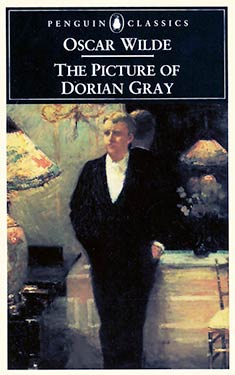Oscar Wilde
Completed 12/1/2018,
Reviewed 12/1/2018
3 stars
I haven’t
read many literary classics. I chose to
read this book because I included it on the LGBTQ SF resource list on the Worlds
Without End site based on my research on the history of LGBTQ themes in SF, Fantasy,
and Horror. In reading it, I wanted to
verify that this was a good book to keep included on the list. Now that I’ve read it, I think it should stay
on the list. There is gay subtext
throughout the novel. However, I didn’t really
enjoy the novel. I thought it was quite
dense and too philosophical for me.
 The novel
begins with Dorian Gray’s portrait being painted by the artist Basil
Hallward. The portrait is Basil’s finest
work, inspired by his homoerotic obsession with Gray. And Gray is such a notably beautiful youth
that everyone wants him for their parties and all the women just plain want
him. At one of his sittings for the
portrait, Basil introduces Gray to his friend Lord Henry, a cynical
narcissist. The two becomes fast
friends, and Lord Henry introduces Gray to his narcissistic philosophy. In a strange moment, Gray wishes he always maintains
the youthful beauty that has been captured by the portait.
The novel
begins with Dorian Gray’s portrait being painted by the artist Basil
Hallward. The portrait is Basil’s finest
work, inspired by his homoerotic obsession with Gray. And Gray is such a notably beautiful youth
that everyone wants him for their parties and all the women just plain want
him. At one of his sittings for the
portrait, Basil introduces Gray to his friend Lord Henry, a cynical
narcissist. The two becomes fast
friends, and Lord Henry introduces Gray to his narcissistic philosophy. In a strange moment, Gray wishes he always maintains
the youthful beauty that has been captured by the portait.
Gray falls
for a young actress. At one performance,
she realizes that being an actress is nothing compared to being in love with
Gray. Her performance is terrible. Gray feels betrayed and disavows his love for
the actress. Distraught, she commits
suicide. This is the beginning of Gray’s
conversion to a terrible, “sinful” person and the first time the portrait
changes to reflect this sin. As time
goes on, he turns to a life of narcissistic debauchery and his portrait
continues to degrade.
There are
several things I didn’t care for in the novel.
The first was that beauty implies goodness and sinful people are
ugly. It’s not just the aging that happens
in the portrait, but that Gray’s sins are revealed by the ugliness, and that if
Gray’s wish hadn’t come true, he himself would have turned ugly by his life of
debauchery. I’m thinking this might have
been a commentary on English morality, but maybe it’s not. It’s hard to guess what Wilde was thinking
when he wrote this over a hundred years ago.
I also didn’t
like that Gray ruined the reputation of a long string of young men. To me, it implied that Gray was having
affairs with all these upright young English high society men, bringing them
down with sexuality. Granted, it shows
the depths of Gray’s debauchery, but the implication is that homosexuality is a
choice and a weapon. Again, maybe Wilde
was creating a satire on English mores in light of their horrific sodomy laws,
which were only repealed in 1967, and maybe I’m just looking at this book with a
too modern pair of eyes.
On the other
hand, the book is quite a good early horror novel and it definitely satirizes
the hypocrisy of English morality. Lord
Henry is sort of the bad angel on Gray’s shoulder. Almost everything he says is morally
deplorable; most notably he’s misogynistic.
On the other hand, Basil is the good angel. His love for Gray is I think a purer form of
love. There’s a line of thought that the
book is autobiographical and Basil represents Wilde and Gray is his lover. I can kind of see this, but I don’t know enough
about Wilde’s life, other than his imprisonment and tragic death a few years
after his release.
Gray is a deplorable
character, but I didn’t feel any empathy for him. When he commits his final atrocity, I really didn’t
care. I was more disturbed by Lord Henry
who seems to get through life unscathed as a narcissistic amoral. I did feel empathy for Basil because he
seemed an innocent and was looking out for Gray’s best interests.
I give this
book three stars out of five. There’s
just too many long passages of philosophy and archaic references, particularly
in the middle of the book. And my lack
of empathy for the main character added to my knocking down of stars. I would have preferred reading this novel in
a class environment. Like many of the
older classics, I think the discussion would have enhanced my understanding of
the book.
No comments:
Post a Comment